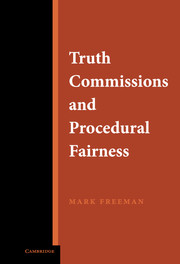Book contents
- Frontmatter
- Contents
- Foreword
- Preface
- Acknowledgments
- Abbreviations
- Part I
- Part II
- 3 Statement Taking
- 4 Subpoena Power
- 5 Search and Seizure Power
- 6 Public Hearings
- 7 Publication of Findings of Individual Responsibility
- Summary of Recommendations
- Appendix 1 Table of Truth Commissions
- Appendix 2 Primary Materials on Truth Commissions
- Appendix 3 Primary Materials on Other Commissions of Inquiry
- Index
7 - Publication of Findings of Individual Responsibility
Published online by Cambridge University Press: 27 October 2009
- Frontmatter
- Contents
- Foreword
- Preface
- Acknowledgments
- Abbreviations
- Part I
- Part II
- 3 Statement Taking
- 4 Subpoena Power
- 5 Search and Seizure Power
- 6 Public Hearings
- 7 Publication of Findings of Individual Responsibility
- Summary of Recommendations
- Appendix 1 Table of Truth Commissions
- Appendix 2 Primary Materials on Truth Commissions
- Appendix 3 Primary Materials on Other Commissions of Inquiry
- Index
Summary
Introduction
The decision by a truth commission to publish findings of individual responsibility in a final report will always be controversial. Although most have lacked the explicit power to do so, the urge to “name names” often remains strong, especially when to refrain from doing so might reinforce a broader environment of impunity.
While a truth commission's public attribution of individual responsibility is distinct from a legal judgment, it raises significant procedural fairness issues. At the heart of these issues is a tension between individual privacy and reputation rights on the one hand, and the victims' and public's right to know the truth on the other. The stakes are high for all concerned. A wrongly accused person could see his or her reputation forever tarnished. Being named could also make it more likely that the person will be prosecuted or sued, especially where a commission is consciously established, and publicly viewed, as a precursor to justice in the courts. For the commission, a false accusation might greatly undermine its credibility, as well as the reception of its overall findings of fact. For victims, the public attribution of individual responsibility may be viewed as an essential, if incomplete, form of justice.
The question of naming names is a familiar one for publishers, who must take into consideration relevant laws on defamation (and corollary defenses such as fair comment) prior to attributing responsibility to any individual in a publication.
- Type
- Chapter
- Information
- Truth Commissions and Procedural Fairness , pp. 268 - 300Publisher: Cambridge University PressPrint publication year: 2006



